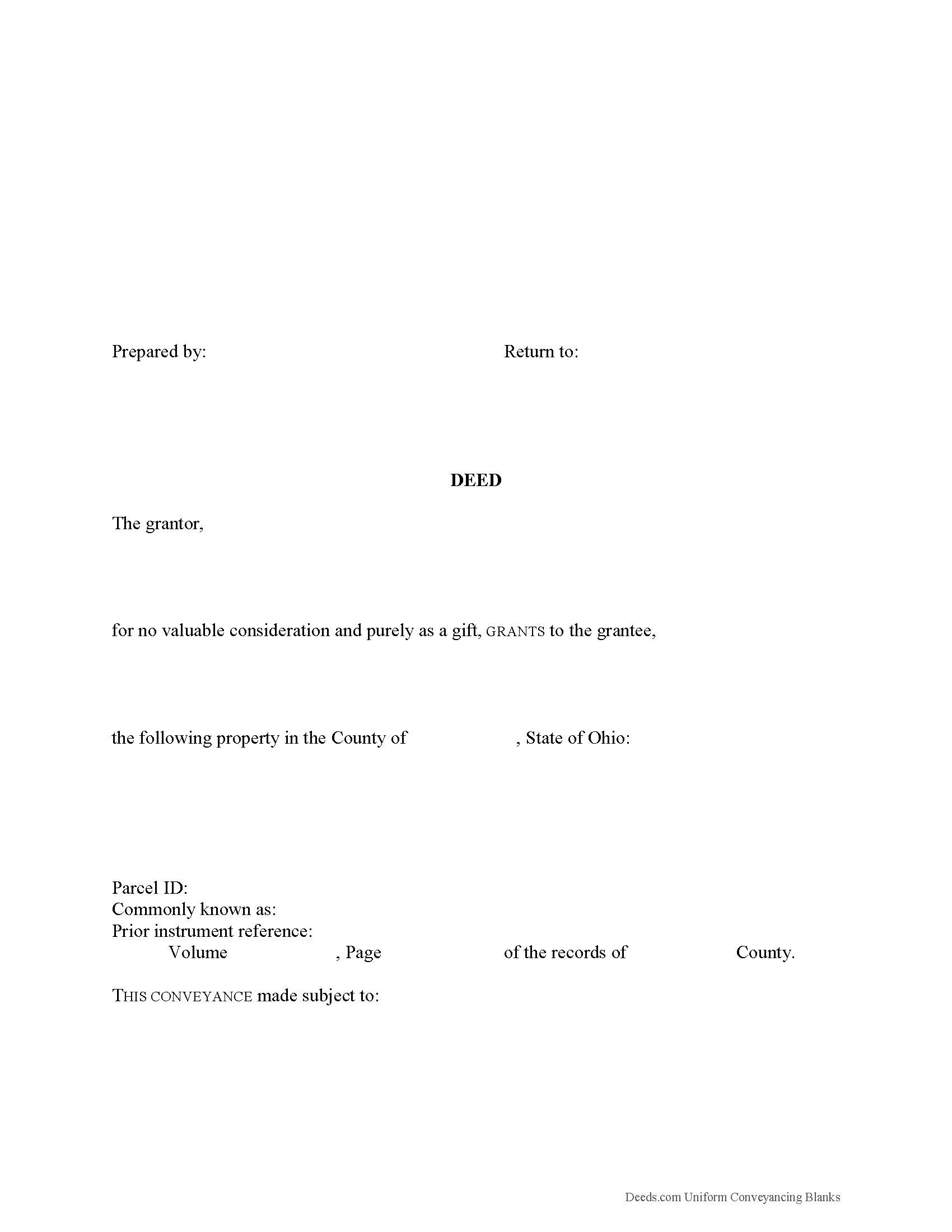Download Ohio Gift Deed Legal Forms

Ohio Gift Deed Overview

Gifts of Real Property in Ohio
Gift deeds convey title to real property from one party to another with no exchange of consideration, monetary or otherwise. Often used to transfer property between family members or to gift property as a charitable act or donation, these conveyances occur during the grantor's lifetime. Gift deeds must contain language that explicitly states that no consideration is expected or required. Ambiguous language, or references to any type of consideration, can make the gift deed contestable in court.
A lawful gift deed includes the grantor's full name, marital status, and mailing address, as well as the grantee's full name, marital status, mailing address, and vesting. Vesting describes how the grantee holds title to the property. Generally, real property is owned in either sole ownership or in co-ownership. For Ohio residential property, the primary methods for holding title are tenancy in common and survivorship tenancy. An estate conveyed to two or more people is considered a tenancy in common, unless a survivorship tenancy is declared (Ohio Rev. Code Section 5302.20(a)).
As with any conveyance of realty, a gift deed requires a complete legal description of the parcel. Contact the county auditor to verify the legal description prior to recording. In Ohio, any deeds that modify a legal description or contain a new legal description require the name and address of the surveyor who created the legal description (Ohio Rev. Code Section 5301.25(B)). All new metes and bounds descriptions prepared by a registered surveyor must be accompanied by a signed and sealed plat of survey.
Ohio law requires deeds to include a reference to the instrument granting title to the current grantor (Ohio Rev. Code Section 5301.011). That document's volume and page or instrument number should appear on the face of the deed, as well as the county where the document is filed.
Ohio recognizes dower rights, which means that if a married man or woman owns an interest in real property, his or her spouse automatically holds an interest in 1/3 of the real property, if they have not relinquished or been barred from it (Ohio Rev. Code Section 2103.02). As such, if the grantor is married and his or her spouse retains dower rights to the property being conveyed, the spouse must relinquish his or her dower rights. If applicable, the spouse's name should appear on the face of the deed. Consult a lawyer with questions regarding dower rights and release.
Detail any restrictions associated with the property and sign the deed in the presence of a notary public or other authorized official. Submit the deed to the appropriate county auditor's office prior to recording so that the owner's name can be transferred on the county's tax list (Ohio Rev. Code Section 319.20). Record the deed at the recorder's office in the county where the property is located for a valid transfer. Contact the same office to confirm accepted forms of payment. A Conveyance Fee Statement (Form DTE 100, or DTE 100EX if claiming an exemption) must be signed by the grantee and filed with the deed.
With gifts of real property, the recipient of the gift (grantee or donee) is not required to declare the amount of the gift as income, but if the property accrues income after the transaction, the grantee is responsible for paying the requisite state and federal income tax [1].
In Ohio, there is no state gift tax, but gifts of real property are subject to the federal gift tax. The person or entity making the gift (grantor or donor) is responsible for paying the federal gift tax; however, if the donor does not pay the gift tax, the donee (grantee) will be held liable [1]. For questions regarding state and federal tax laws, consult a tax specialist.
In accordance with federal law, individuals are permitted an annual exclusion of $15,000 on gifts. This means that gifts valued below $15,000 do not require a federal gift tax return (Form 709). However, if the gift's value could possibly be disputed by the IRS, a donor may benefit from filing a Form 709 [2].
(Ohio Gift Deed Package includes form, guidelines, and completed example) This article is provided for informational purposes only and is not a substitute for legal advice. Contact an Ohio lawyer with any questions related to the transfer of real property.
[1] http://msuextension.org/publications/FamilyFinancialManagement/MT199105HR.pdf
[2] https://www.irs.gov/businesses/small-businesses-self-employed/frequently-asked-questions-on-gift-taxes